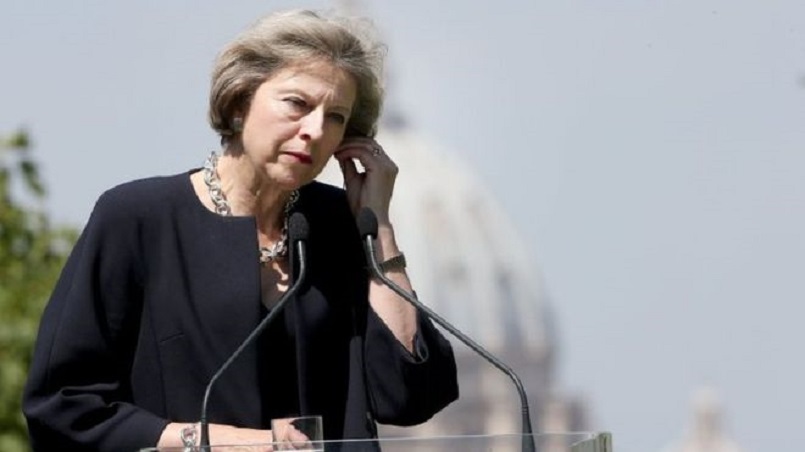
George Orwell said that political language consists largely of "euphemism, question-begging and sheer cloudy vagueness".
The same could be said about the post-referendum debate. The phrase "Brexit means Brexit" has seen the government through the summer, but has now reached the end of its usefulness.
It was designed to persuade doubting Remainers that the UK really will leave the EU, something Theresa May was once again forced to confirm during her news conference with President Obama here in China.
But over the months the slogan has inverted into something different, a symbol of the government's uncertainty about what Brexit will actually mean for our relationship with the EU.
Migration controls
This lack of clarity reflects the divisions within ministerial ranks over what deal Britain should aim for.
And these divisions are illustrated by the way the prime minister's words about Brexit are interpreted by both sides in this debate.
Take, for example, the briefing put out by Downing Street last week after the Cabinet meeting in Chequers. Ministers agreed the UK should seek a unique deal with the EU: "This must mean controls on the numbers of people who come to Britain from Europe but also a positive outcome for those who wish to trade goods and services."
Now some determined Brexiteers read this as Mrs May setting down a red line that she would only accept a deal that would end mass migration from the EU.
Well, not quite. There is a difference between the UK achieving control over the number of EU workers coming here and actually stopping them coming in their entirety.
Let us look at what Mrs May said on her first outing on the Andrew Marr show on Sunday.
She said that voters had been very clear "that they don't want free movement to continue in the way that it has done in the past. They do want to see controls of movement of people coming in from the European Union".
So note that. She doesn't necessarily want to get rid of all free movement, she just doesn't want it to carry on as it has in the past.
Now there is nothing particularly new or objectionable about a politician using opaque language to describe a half-formed policy. But there was a hint from the prime minister that she might want to change the language about Brexit - or perhaps even exploit it - to help get a deal.
Circular debate
She told Andrew Marr: "I don't want to adopt a particular model, and people use phrases about access to the market, about customs unions and so forth, I prefer to look at it and say let's work out what the best deal for us will be in trade in goods and services, and then let's be ambitious and go out there and find it."
Mrs May is not the first to contemplate this idea of changing the language about Brexit, not least because it could make a deal more feasible.
The aim would be to escape the increasingly circular debate about what balance the UK should achieve between curbing free movement and getting access to the single market.
So, for example, the government could opt formally out of free movement entirely, but agree a deal that in practice makes it relatively straightforward for EU workers to come to the UK on a scale controlled by ministers.
Equally the government could take Britain formally out of the single market while in practice retaining some or many of the elements of membership as part of a trade deal.
George Orwell said that political language often gave "an appearance of solidity to pure wind". But it can also be used to finesse a deal that might otherwise prove hard to achieve.
